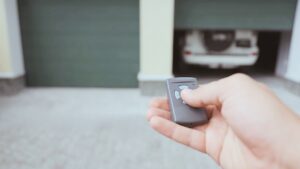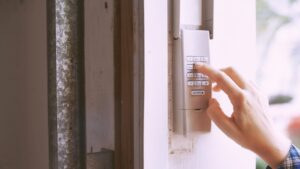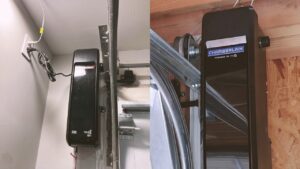Connect With A Garage Expert
Connect with local experts, Compare quotes, Get the best price.
Is your garage door clicking when you open or close it? Don’t worry. Countless homeowners encounter issues with their garage doors each year, and a clicking sound is a common complaint.
Did you know that the average lifespan of a garage door system is about 15 to 30 years? That’s a long time for a mechanism to function smoothly, but it also means there’s potential for wear and tear.
Addressing a clicking garage door is crucial because it disrupts your peace and could indicate underlying problems that need attention. So, let’s dive into the seven possible reasons for that clicking noise and explore how you can fix them.
Connect With A Garage Expert
Connect with local experts, Compare quotes, Get the best price.
Why Does My Garage Door Make a Clicking Noise?
While the causes of a clicking garage door vary, here are some of the most common factors.
1. Garage Door Opener Is Locked
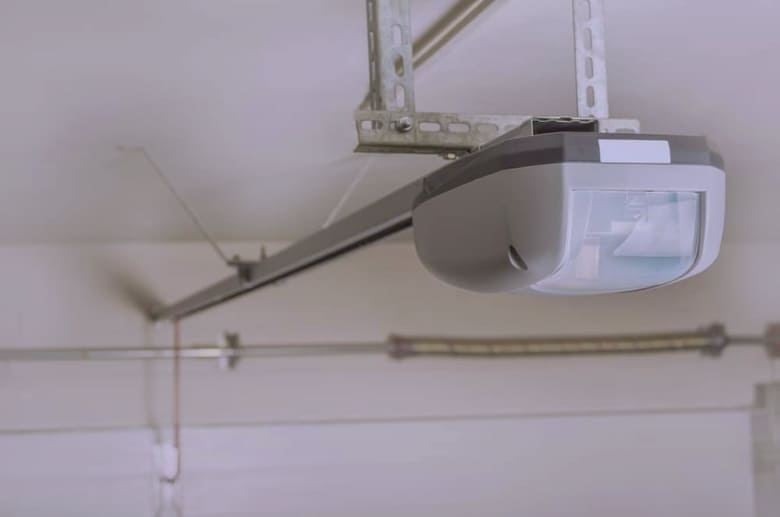
If your garage door opener is locked, it can generate a loud noise when you attempt to open or close the door. this clicking noise usually originates from the opener unit itself.
This occurs because the opener’s motor tries to engage with the door but can’t do so due to the lock being engaged. The sound is typically repetitive and rhythmic, resembling a series of clicks.
How to Fix It?
To unlock your garage door opener, follow these steps:
- Identify the type of lock: Different garage door opener brands may have different locking mechanisms. For example, Chamberlain and LiftMaster often utilize a “Vacation” or “Lock” button on the wall control console or the remote control. Check your brand and model’s user manual or online resources for accurate instructions.
- Unlock the opener: Once you’ve identified the lock, press and hold the corresponding button until the lock indicator light turns off or the opener unit emits a beep. This action disengages the lock and allows the opener to operate normally.
It’s best to seek assistance from a professional if you are uncertain about performing the unlocking procedure or if you suspect there may be other underlying issues with your garage door opener.
2. Something is Obstructing the Safety Sensors
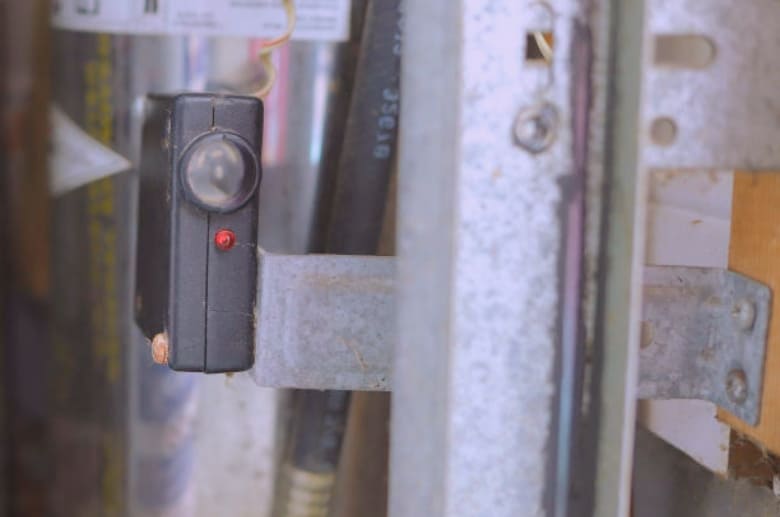
When the safety sensors on your garage door opener become obstructed, it can lead to a clicking sound during operation. These sensors are usually located near the bottom of the tracks on both sides of the garage door.
If something is blocking the sensors, such as dirt, debris, or even misaligned sensors, the system may interpret it as an obstruction, causing the clicking noise. The safety mechanism kicks in, preventing the door from closing completely and producing a noticeable click indicating a problem with the garage door’s operation.
How to Fix It?
To resolve the clicking noise caused by obstructed safety sensors, inspect the area around them and ensure no visible objects or debris are blocking their path. If you notice any dirt or buildup, gently clean the sensors using a soft cloth.
Be sure the sensors are properly aligned. They should be facing each other directly and not be misaligned. Typically, there will be two lights on each sensor. A green light indicates that the units are powered on, while a red light indicates no obstacle between the sensors and they have a clear line of sight.
Adjust them if necessary, and refer to your garage door opener’s manual for specific instructions on properly adjusting the sensors.
3. Damaged Logic Boards
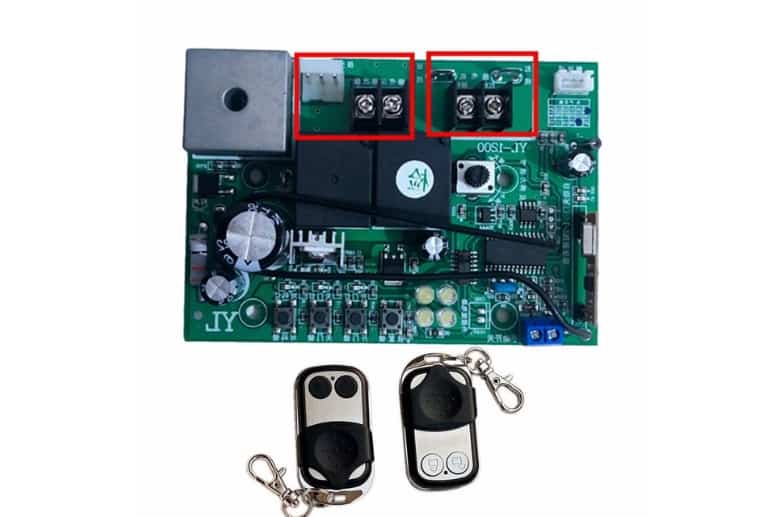
The logic board is the electronic control panel that manages the operation of your garage door opener. When it’s not working correctly, it could be anything from a fried capacitor to an overheated processor – or maybe even something as silly as static electricity.
Whatever the cause, logic board malfunctions are no laughing matter – and they usually require a professional to fix. When this component malfunctions, it can result in a clicking sound.
It’s important to note that every garage door system is different, and some may have specific indicators, such as flashing lights within the opener unit, to alert you to a faulty logic board.
How to Fix It?
If you feel confident in your technical abilities, you may attempt to replace the logic board. Consult the manufacturer’s website for guidance on ordering the correct replacement part, and follow the provided instructions.
Also, we highly recommend calling a professional to check and repair your garage door opener. They have the expertise and experience to diagnose the issue and ensure it is resolved properly and accurately.
4. Issues with The Garage Door Opener
One potential source of the clicking noise could be your trusty garage door opener. Over time, these mechanical marvels may develop problems resulting in annoying clicks.
On average, a garage door opener can last anywhere from 10 to 15 years, depending on its quality and maintenance.
However, remember that this is just an estimate, and individual experiences may vary. So, it’s worth investigating the opener if you’re dealing with clicking noises.
How to Fix It?
Now that we’ve identified the garage door opener as a potential source of the clicking noise, it’s time to get down to business and figure out how to fix it.
1. Troubleshooting common opener problems:
- Trolley opener issues: Inspect the trolley mechanism for any obstructions or debris causing it to click or make noise. Clean out any dirt or debris if you find any. Also, check the trolley for any loose bolts or screws. Tighten them if necessary. Finally, lubricate the trolley track and rollers with a silicone-based lubricant to ensure smooth operation. Test the garage door opener after performing these steps to see if the clicking noise has been resolved.
- Examine the drive gear: The drive gear moves the door along the tracks. When you remove the cover of your garage door opener, you will typically see a chain wrapped around a set of white plastic gear. If it’s worn out or damaged, it can cause clicking noises. In such cases, replacing the gear might be necessary.
- Lubricate moving parts: Regularly lubricating the opener’s moving parts, such as the rollers, hinges, and springs, can reduce friction and minimize clicking sounds.
2. When replacement is necessary:
- If your opener is nearing or exceeding its average lifespan, which is around 10-15 years, it might be time to consider a replacement. Newer models often have advanced features, improved efficiency, and quieter operation.
- If troubleshooting doesn’t resolve the clicking noise issue or if you notice other major problems like intermittent functioning or unusual sounds, it’s advisable to consult a professional technician. They can assess the situation and recommend the best course of action.
Again, tinkering with your garage door opener can be complex and potentially dangerous, so it’s crucial to exercise caution.
5. Misaligned Tracks
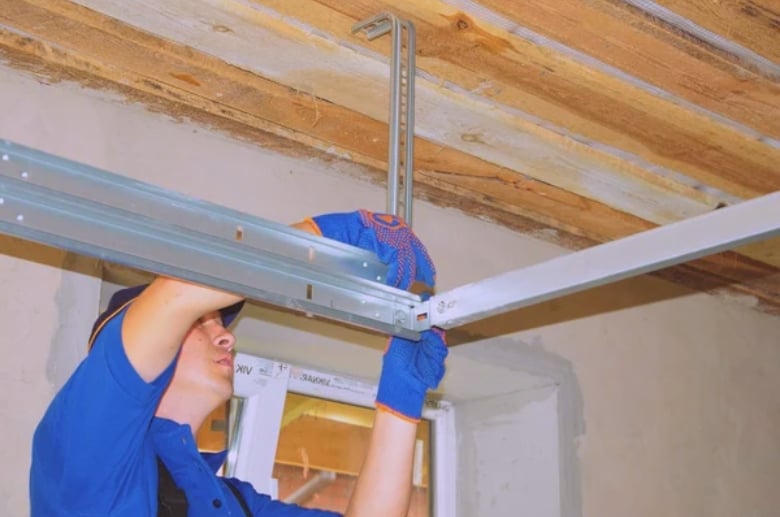
When the tracks of a garage door opener become misaligned, it can cause clicking noises during operation. This is due to the internal components of the system rubbing against each other, resulting in an audible click.
The clicking sound is typically heard when opening or closing the door as the rollers and springs move along the track. This issue can be caused by regular wear and tear or by external factors such as collisions with objects, animals, or people.
Connect With A Garage Expert
Connect with local experts, Compare quotes, Get the best price.
How to Fix It?
Fortunately, realigning the tracks of your garage door is a task you can tackle yourself. Follow these step-by-step instructions and take necessary safety precautions to avoid mishaps.
- Safety First: Before you begin, ensure your garage door opener is disconnected from the power source to prevent accidents.
- Check for Alignment Issues: Inspect the tracks on both sides of your garage door. Look for any gaps, bends, or misalignments. If you spot any issues, proceed to the next step.
- Loosen the Bolts: Use a wrench or socket set to loosen the bolts that secure the misaligned tracks. Don’t remove them entirely, just loosen them enough to allow adjustments.
- Align the Tracks: Gently tap the misaligned tracks with a rubber mallet, hammer, and a block of wood to nudge them back into the correct position. Use a level to ensure they are perfectly aligned vertically and horizontally.
- Tighten the Bolts: Carefully tighten the tracks, but don’t over-tighten them once they are aligned. Ensure that the tracks are secure but still allow for slight movement.
- Test the Door: Reconnect your garage door opener to the power source and test the door’s movement. It should now open and close smoothly without any clicking noise.
Garage Insider Tip: If you encounter significant track damage or have concerns about handling the repair yourself, it’s best to call a professional garage door technician. Your safety should always be a top priority!
6. Worn Out Rollers
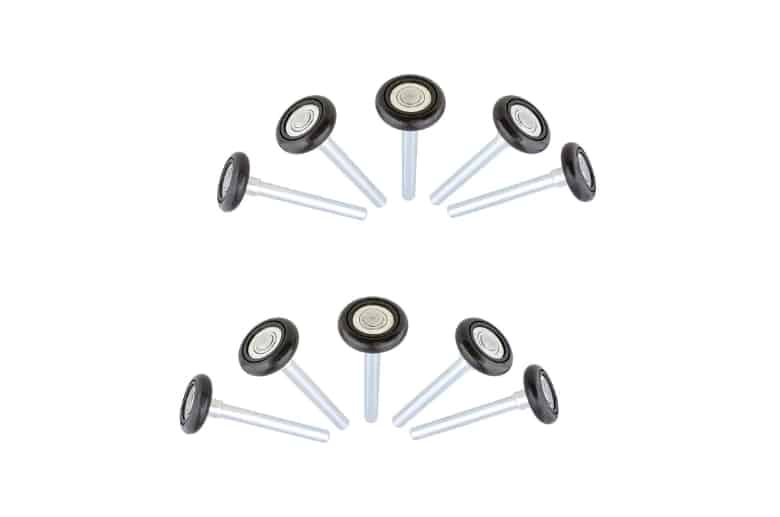
Garage door rollers are compact wheels that allow the garage door to move smoothly along its tracks.
Over time, the constant friction and wear can cause the rollers to develop flat spots or become misaligned. As a result, when the door is operated, these worn-out rollers can create a distinct clicking sound.
It’s important to note that the clicking sound comes directly from the rollers themselves. While it may be tempting to assume that the garage door opener is the noise source, the worn-out rollers are causing the issue in most cases.
How to Fix It?
The good news is that fixing worn-out rollers is typically a straightforward process. Here’s a guide to help you resolve the problem:
- Safety first: Before attempting any repairs, ensure your garage door is fully closed and disconnected from the opener.
- Inspection: Look for signs of flat spots, cracks, or misalignment. If the rollers are visibly damaged or excessively worn, they will likely need to be replaced.
- Lubrication: Use a lubricant designed for garage doors and follow the manufacturer’s instructions.
- Replacement: If the rollers are beyond repair, it’s advisable to replace them. Consult your garage door manufacturer or a professional technician to ensure you get the correct type and size of rollers for your specific door.
- If you’re uncomfortable working with garage doors or lack the necessary tools and expertise, calling a reputable garage door technician is safer.
- Additionally, if you’ve followed the steps above and the clicking noise persists, it could indicate a more complex issue that requires professional attention.
7. Damaged Springs
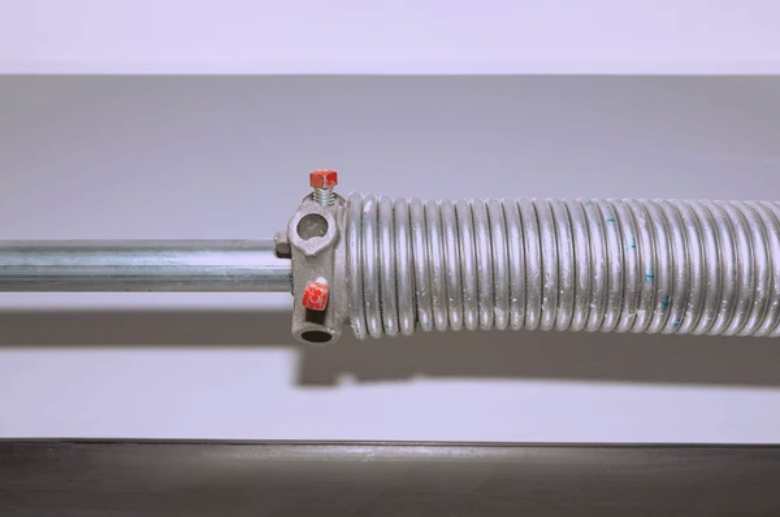
Garage door springs are long metal coils that help counterbalance the door’s weight, making it easier to open and close. However, springs can become worn out or damaged over time, leading to that annoying clicking noise.
The average lifespan of garage door springs depends on several factors, such as usage frequency and environmental conditions. Generally, torsion springs last around 10,000 cycles, while extension springs can handle about 15,000 cycles. Once the springs exceed their expected lifespan, they are more prone to breaking or becoming noisy.
Signs of damaged springs include:
- Loud clicking or popping sounds: If you hear a distinct clicking noise when opening or closing your garage door, it’s likely due to damaged springs.
- Imbalanced door: Springs that are worn out can cause the door to become unbalanced, leading to uneven movement or difficulty in opening and closing.
Possible Consequences if Left Unaddressed
Ignoring damaged springs can have serious consequences for your garage door system. The unbalanced door puts excessive strain on other components, such as the opener and tracks, which can lead to further damage and costly repairs down the line.
How to Fix It?
If you’re up for some DIY adventure, you can try making minor spring adjustments. However, it’s important to note that working with garage door springs can be dangerous, so always prioritize your safety. Here’s a general procedure for minor spring adjustments:
- Safety: Before attempting any repairs, disconnect the power to the garage door opener and ensure the door is fully closed.
- Identify the problem: Inspect the springs to determine if they are damaged or broken. Look for signs of wear, rust, or visible damage, like gaps in the springs.
- Adjustments: If you have torsion springs, you can use a winding bar to make slight adjustments. Turn the winding cone in small increments to tighten or loosen the tension. You may need to adjust the tension on the pulley system for extension springs.
- Test the door: After making adjustments, carefully test the door’s operation to see if the clicking noise has subsided. Ensure that the door opens and closes smoothly and remains balanced.
When to Call a Professional
If you’re uncomfortable or unsure about working with garage door springs, it’s best to seek professional help. This is especially important when dealing with torsion springs, as they are under extreme tension and can be dangerous to work with.
Connect With A Garage Expert
Connect with local experts, Compare quotes, Get the best price.
Preventive Measures for Garage Door Clicking Sound
Preventive maintenance is essential for prolonging the lifespan of your garage door system and reducing the likelihood of problems such as clicking noises. Let’s dive into some effective strategies to prevent that pesky clicking noise.
Regular Maintenance
Regular maintenance is crucial for keeping your garage door in top shape and minimizing the chances of encountering clicking sounds. Here’s a handy checklist for your regular garage door maintenance:
- Lubricate moving parts: Apply a silicone-based lubricant to the rollers, hinges, tracks, and springs.
- Tighten loose hardware: Inspect and tighten all the hardware, including brackets, hinges, and screws, using a wrench or socket set.
- Check and replace weatherstripping: If the weatherstripping is worn out or damaged, replace it to ensure a proper seal and reduce noise from outside.
- Test the door balance: Disconnect the garage door opener and manually lift the door halfway. If it stays in place, it is properly balanced. If not, you may need to adjust the tension springs or call a professional.
- Inspect cables and springs: If you notice any damage, it’s important to have them repaired or replaced promptly to prevent further issues.
Importance of timely maintenance
Regular maintenance on your garage door reduces the likelihood of clicking sounds and offers several other benefits. It helps in the following:
- Enhancing Safety: By identifying and addressing potential issues early on, you minimize the risk of accidents or injuries caused by a malfunctioning garage door.
- Extending Lifespan: Proper maintenance can significantly prolong the lifespan of your garage door system, saving you money in the long run by avoiding expensive repairs or premature replacements.
- Improving Efficiency: Well-maintained garage doors operate more smoothly and efficiently, saving energy and reducing strain on the opener mechanism.
Spotting Early Warning Signs
Recognizing early warning signs of potential problems is crucial in preventing serious issues and avoiding the dreaded clicking noise. Keep an eye out for the following indicators:
- Unusual Noises: Pay attention to strange sounds, such as grinding, squeaking, or clicking, when operating the garage door.
- Slow or Uneven Operation: If your garage door starts to open or close slower than usual or moves unevenly, it could be a sign of a problem.
- Jerky Movements: If the door jerks or gets stuck during operation, it could indicate an obstruction, damaged tracks, or an imbalanced door.
- Sagging or Misaligned Door: Check if your garage door appears crooked, sags on one side, or doesn’t close evenly.
Benefits of Early Problem Detection
Detecting issues early on can save you from costly repairs and prevent inconveniences. Here are the benefits of spotting problems at an early stage:
- Cost Savings: By promptly addressing minor issues, you can prevent them from escalating into major problems, potentially saving you significant money.
- Minimized Downtime: Early detection and timely repairs ensure that your garage door stays functional and minimizes any disruption to your daily routine.
- Enhanced Safety: Identifying and fixing problems promptly reduces the risk of accidents or injuries associated with a malfunctioning garage door.
Final Words
No homeowner wants to deal with a noisy and malfunctioning garage door. Fortunately, you can take preventive measures such as lubricating the parts regularly and inspecting them for signs of damage or wear to keep your garage door in optimal condition.
If you encounter garage clicking noise issues, addressing them promptly before they escalate into more serious problems is important.
However, if the problem is beyond your scope of expertise or comfort level, always consult an experienced technician rather than attempt repairs yourself.


